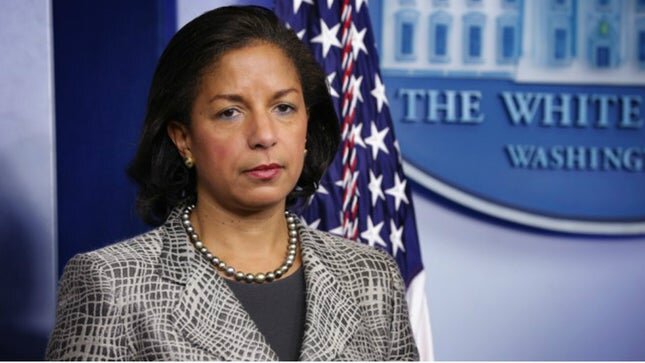Susan Rice says Trump should sideline Bolton and Pompeo, send envoy to Iran to defuse tension

Susan Rice, the former U.S. national security advisor, has said President Donald Trump needs to sideline John Bolton, the national security advisor, and Secretary of State Mike Pompeo and send an envoy to Iran for talks if he seeks to defuse tension.
In an article published by the New York Times on Sunday, she said that Trump should take five actions, including sidelining Bolton and Pompeo and sending envoy to Iran to defuse tension with Iran in the region.
Following is an excerpt of the article:
First, he needs to sideline his out-of-control national security adviser plus his hawkish sidekick, the secretary of state.
Second, the president needs to narrow and clarify his redlines for military action against Iran. He should make plain that three things would force consideration of a United States military response — attacks on American personnel, Iran rushing to acquire the fissile material for a bomb and any direct Iranian attack on Israel. Mr. Trump should also reassure Congress that he will not start an unnecessary war of choice against Iran that would flout his own redlines and require wildly contorting a 2002 authorization to use force against Al Qaeda.
Third, Mr. Trump needs quickly to communicate directly his redlines to Iran and propose a path to avert war. To do so, he should enlist a retired nonpartisan career ambassador who knows Iran well — someone of the caliber of Bill Burns, a former deputy secretary of state, who has negotiated with Iran, or Thomas Pickering, a six-time ambassador and former under secretary of state. If Mr. Trump can’t stomach someone outside his team, he can send his reputedly rational deputy secretary of state, John Sullivan, to New York to meet with Iran’s ambassador to the United Nations, Majid Takht Ravanchi, who studied in the United States, helped negotiate the nuclear deal and is a reliable conduit to Tehran.
Fourth, Mr. Trump needs to lay out a series of reciprocal steps whereby both sides give a little, so familiarity and confidence can be built for more significant discussions. For instance, Mr. Trump might offer to allow Iran again to export its low-enriched uranium in exchange for Iran shelving its threat to exceed the stockpile limits imposed by the nuclear deal. (Iran says it uses or sells the uranium to fuel power plants, but Mr. Trump blocked its export last month.)
Next, he could trade a pause in the buildup of additional United States forces in the (Persian) Gulf for a firm Iranian commitment not to target foreign aircraft. Let’s test if Iran will adhere to that pledge, for an initial ninety days, while we hold in reserve the option of deploying reinforcements.
Fifth, President Trump should offer a time-limited “suspension” of the United States withdrawal from the nuclear deal and allow temporary (perhaps partial) relief from the newly reimposed sanctions, if Iran immediately releases American persons it has imprisoned and agrees to direct talks with the United States and the other partners to the nuclear deal on extending and strengthening the agreement. If the talks yield progress, we could expand sanctions relief.
Leave a Comment